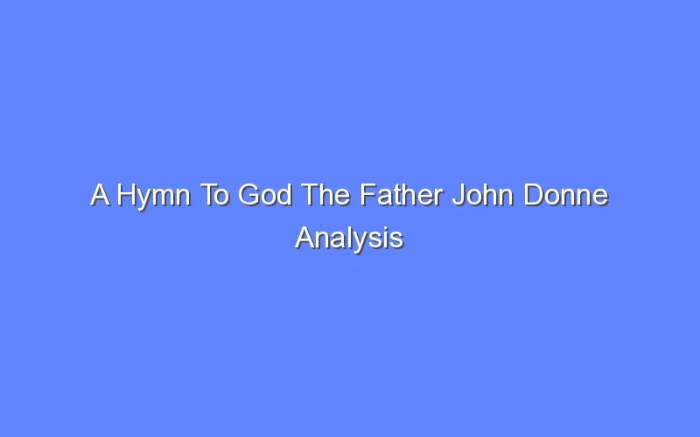A hymn to god the father analysis – The hymn “A Hymn to God the Father” is a profound and moving expression of Christian faith that has resonated with believers for centuries. This comprehensive analysis explores the historical, literary, theological, and musical aspects of the hymn, offering a deeper understanding of its significance and impact.
Hymn to God the Father Analysis: A Hymn To God The Father Analysis

The “Hymn to God the Father” is a classic Christian hymn that has been sung for centuries. It was written by Charles Wesley in 1739 and is based on the Nicene Creed. The hymn is a powerful expression of praise and worship to God the Father.
Hymn’s Historical and Literary Context, A hymn to god the father analysis
The hymn was written during a time of great religious revival in England. Wesley was a leader of the Methodist movement, and the hymn was intended to be sung by Methodists as a way of expressing their faith. The hymn is written in a simple, straightforward style, with clear and concise language.
It uses a variety of literary devices, including metaphor, simile, and personification, to create a vivid and powerful image of God.
Theological Themes
The hymn explores a number of important theological themes, including the nature of God, the relationship between God and humanity, and the significance of salvation. Wesley emphasizes God’s power, majesty, and glory, and he describes God as the “Father of all” who loves and cares for his children.
The hymn also explores the relationship between God and humanity. Wesley emphasizes that God is a personal God who knows and loves each individual. He also emphasizes the importance of faith in God, and he describes faith as the means by which we can enter into a relationship with God.
Finally, the hymn explores the significance of salvation. Wesley emphasizes that salvation is a gift from God, and he describes salvation as the means by which we can be reconciled to God and enter into eternal life.
Poetic and Musical Elements
The hymn is written in a simple, straightforward style, with clear and concise language. It uses a variety of literary devices, including metaphor, simile, and personification, to create a vivid and powerful image of God.
The hymn is also set to a beautiful and moving melody. The melody is simple and easy to sing, and it helps to create a sense of awe and wonder in the listener.
Impact and Legacy
The “Hymn to God the Father” has had a profound impact on Christian worship. It has been translated into many languages and is sung in churches around the world. The hymn has also been used in a variety of other settings, including concerts, plays, and movies.
The hymn is a powerful expression of praise and worship to God the Father. It is a hymn that has stood the test of time and continues to be sung by Christians today.
Key Questions Answered
Who wrote “A Hymn to God the Father”?
The hymn was written by Charles Wesley, an English Methodist preacher and hymn writer.
What is the main theological theme of the hymn?
The hymn explores the themes of God’s majesty, love, and the relationship between God and humanity.
How has the hymn been used over time?
The hymn has been widely used in Christian worship services, as well as in various musical and literary contexts.
